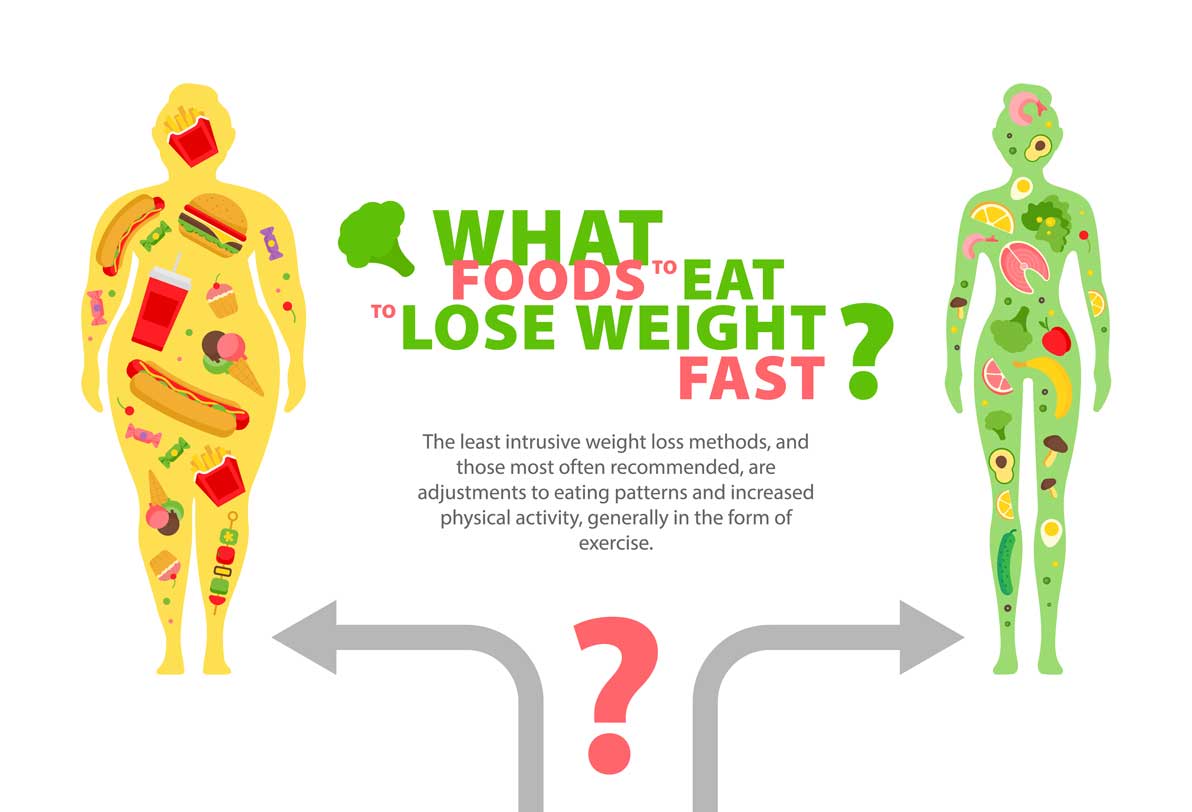Looking to lose weight fast? Read this comprehensive guide on how to lose weight quickly and effectively. Learn about proven strategies, healthy habits, and expert tips to achieve your weight loss goals.
Introduction
In today’s fast-paced world, many people struggle with weight management. The desire to shed those extra pounds quickly and effectively has led to an abundance of weight loss methods and diets claiming to deliver fast results. However, not all of these approaches are healthy or sustainable.
In this guide, we will explore evidence-based strategies and expert advice on how to lose weight fast in a safe and sustainable manner. From understanding the fundamentals of weight loss to implementing healthy lifestyle changes, we will cover everything you need to know to kick-start your weight loss journey.
Table of Contents
- Understanding Weight Loss
- Setting Realistic Goals
- Creating a Calorie Deficit
- Choosing a Balanced Diet
- Incorporating Regular Exercise
- Managing Portion Sizes
- Prioritizing Protein Intake
- Hydrating for Weight Loss
- Limiting Processed Foods
- Avoiding Sugary Beverages
- Getting Sufficient Sleep
- Stress Management
- Intuitive Eating
- Intermittent Fasting
- Tracking Progress
- Healthy Snacking
- Effective Meal Planning
- Exploring Weight Loss Supplements
- Building Muscle Mass
- Maintaining Long-Term Weight Loss
- Seeking Professional Guidance
- Common Weight Loss Mistakes
- FAQs
- Conclusion
Understanding Weight Loss
Before diving into the strategies for losing weight fast, it’s crucial to understand the basics of weight loss. Weight loss occurs when you consistently consume fewer calories than you burn. This calorie deficit forces your body to utilize stored fat for energy, resulting in weight loss over time.
Setting Realistic Goals
Setting realistic weight loss goals is essential for staying motivated and avoiding disappointment. It’s important to remember that healthy weight loss is gradual, and aiming to lose 1-2 pounds per week is a realistic target. Rapid weight loss can often lead to muscle loss or nutritional deficiencies.
Creating a Calorie Deficit
To lose weight fast, you need to create a calorie deficit by consuming fewer calories than your body needs. While it’s tempting to drastically reduce your calorie intake, this approach can be counterproductive and unsustainable. Gradually reducing your daily calorie intake by 500-1000 calories is a more sustainable approach.
Choosing a Balanced Diet
A balanced diet is crucial for sustainable weight loss. Focus on incorporating nutrient-dense foods like fruits, vegetables, lean proteins, whole grains, and healthy fats into your meals. These foods provide essential nutrients while keeping you satisfied and energized throughout the day.
Incorporating Regular Exercise
Regular exercise is key to losing weight fast and improving overall health. Combining cardiovascular exercises like running, swimming, or cycling with strength training can help boost your metabolism, burn calories, and build lean muscle mass. Aim for at least 150 minutes of moderate-intensity exercise per week.
Managing Portion Sizes
Controlling portion sizes is vital for weight loss. Use smaller plates and bowls to help control your food intake. Focus on mindful eating, savoring each bite and listening to your body’s hunger and fullness cues. Avoid mindless snacking or eating in front of screens, as it can lead to overconsumption.
Prioritizing Protein Intake
Protein is an essential nutrient for weight loss. It helps keep you feeling full and satisfied while preserving muscle mass during calorie restriction. Include lean sources of protein such as chicken, fish, tofu, and legumes in your meals. Aim for a protein-rich breakfast to kick-start your metabolism.
Hydrating for Weight Loss
Drinking enough water is often overlooked but plays a significant role in weight loss. Water helps suppress appetite, boosts metabolism, and aids in digestion. Aim to drink at least 8 cups (64 ounces) of water per day. Replace sugary beverages with water to cut down on unnecessary calories.
Limiting Processed Foods
Processed foods are often high in calories, unhealthy fats, added sugars, and sodium. These empty calories can hinder your weight loss efforts. Opt for whole, unprocessed foods whenever possible. Cook meals at home using fresh ingredients to have better control over your calorie and nutrient intake.
Avoiding Sugary Beverages
Sugary beverages like soda, energy drinks, and sweetened juices are packed with calories and offer little to no nutritional value. These drinks can quickly contribute to weight gain. Instead, opt for healthier alternatives like infused water, unsweetened tea, or black coffee.
Getting Sufficient Sleep
Adequate sleep is crucial for weight management. Lack of sleep disrupts hunger-regulating hormones, leading to increased appetite and cravings. Aim for 7-9 hours of quality sleep each night to support your weight loss efforts. Establish a relaxing bedtime routine and create a conducive sleep environment.
Stress Management
Stress can sabotage your weight loss efforts. When stressed, your body releases cortisol, a hormone that promotes fat storage, especially around the abdominal area. Incorporate stress-management techniques like meditation, yoga, or deep breathing exercises into your daily routine to reduce stress levels.
Intuitive Eating
Intuitive eating focuses on listening to your body’s natural hunger and fullness cues. It encourages mindful eating and a healthy relationship with food. By honoring your body’s signals, you can maintain a balanced approach to eating without restrictive diets or excessive calorie counting.
Intermittent Fasting
Intermittent fasting is an eating pattern that cycles between periods of fasting and eating. It has gained popularity as a weight loss strategy. There are various intermittent fasting methods, such as the 16/8 method or alternate-day fasting. However, it’s essential to consult with a healthcare professional before starting any fasting regimen.
Tracking Progress
Tracking your progress can provide motivation and help you stay on track with your weight loss goals. Keep a food journal to monitor your calorie intake and track your workouts. Additionally, regularly measure your weight, body measurements, or take progress photos to visually see the changes over time.
Healthy Snacking
Snacking can either support or hinder your weight loss efforts. Opt for healthy snacks like fruits, vegetables, Greek yogurt, or nuts. These snacks are nutrient-dense and provide a good balance of macronutrients. Plan your snacks ahead of time to avoid reaching for unhealthy options when hunger strikes.
Effective Meal Planning
Meal planning can save you time, money, and help you make healthier food choices. Plan your meals for the week, create a shopping list, and prep ingredients in advance. Having nutritious meals readily available can prevent impulsive food choices and keep you on track with your weight loss goals.
Exploring Weight Loss Supplements
Weight loss supplements are a controversial topic, and their efficacy varies. While some supplements may aid in weight loss, they are not a magic solution and should be approached with caution. Consult with a healthcare professional before incorporating any weight loss supplement into your routine.
Building Muscle Mass
Building muscle mass is beneficial for weight loss as muscle burns more calories than fat. Incorporate strength training exercises into your routine to build lean muscle. Focus on compound exercises like squats, lunges, push-ups, and deadlifts. Don’t be afraid to lift weights; it won’t make you bulky.
Maintaining Long-Term Weight Loss
Sustainable weight loss requires long-term commitment and lifestyle changes. Gradually incorporate healthy habits into your daily routine, such as mindful eating, regular exercise, and stress management. Avoid quick fixes or fad diets that promise rapid results but are difficult to maintain in the long run.
Seeking Professional Guidance
If you’re struggling with weight loss or have underlying health conditions, it’s important to seek professional guidance. Consulting a registered dietitian, nutritionist, or healthcare provider can provide personalized advice based on your individual needs and ensure a safe and effective weight loss journey.
Common Weight Loss Mistakes
Avoiding common weight loss mistakes can help you stay on track and achieve your goals more efficiently. Some common pitfalls to watch out for include:
- Skipping meals: Skipping meals can slow down your metabolism and lead to overeating later in the day. It’s important to fuel your body with regular, balanced meals.
- Relying on crash diets: Crash diets may offer quick results, but they are not sustainable. They often lead to weight regain once you resume normal eating habits.
- Over-restriction: Severely restricting calories or eliminating entire food groups can lead to nutrient deficiencies and an unhealthy relationship with food.
- Neglecting exercise: While diet plays a significant role in weight loss, exercise is equally important. Neglecting exercise can result in muscle loss and a slower metabolism.
- Ignoring portion sizes: Even healthy foods can contribute to weight gain if consumed in excessive amounts. Be mindful of portion sizes to maintain a calorie deficit.
- Not addressing emotional eating: Emotional eating can hinder weight loss progress. Find alternative ways to cope with emotions and stress instead of turning to food.
FAQs
- Can I lose weight fast without exercise?
- While exercise is beneficial for weight loss and overall health, you can still lose weight by focusing on creating a calorie deficit through diet alone. However, combining a healthy diet with regular exercise yields the best results.
- Are there any foods that help burn fat?
- While certain foods may slightly increase metabolism or promote fat burning, there are no magic foods that directly burn fat. A balanced diet, combined with exercise and a calorie deficit, is key for weight loss.
- Is it possible to lose weight fast and keep it off?
- Sustainable weight loss involves gradual and consistent progress. Rapid weight loss is often short-lived and may result in regaining the weight. Focus on healthy lifestyle changes for long-term weight management.
- Are weight loss supplements safe?
- Weight loss supplements vary in their safety and effectiveness. It’s important to consult with a healthcare professional before taking any supplements to ensure they are safe and suitable for you.
- Can stress affect weight loss?
- Yes, stress can impact weight loss. Stress triggers the release of cortisol, which can increase appetite and promote fat storage, particularly in the abdominal area. Managing stress through relaxation techniques is important for weight management.
- How can I stay motivated during my weight loss journey?
- Staying motivated can be challenging, but setting realistic goals, tracking progress, celebrating achievements, seeking support from loved ones, and focusing on the positive changes in your body and health can help maintain motivation.
Conclusion
Losing weight fast requires a holistic approach that includes healthy eating habits, regular exercise, and lifestyle changes. By implementing the strategies outlined in this guide, you can achieve your weight loss goals safely and effectively. Remember to prioritize your health, listen to your body, and seek professional guidance when needed.
Unlock the secrets to successful weight loss by following these expert tips and take control of your health and well-being. Share this article with others and visit markantony.org for more How-to Guides, unlocking knowledge, and mastering skills.

